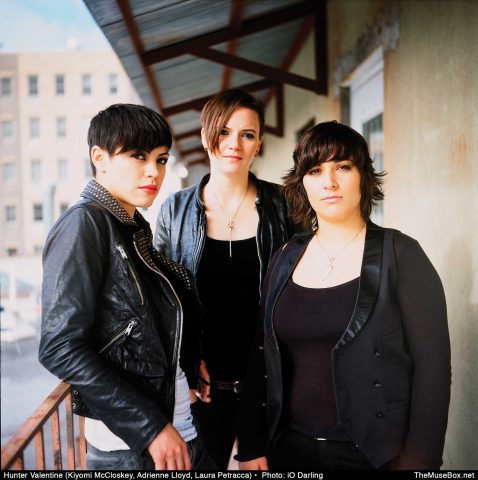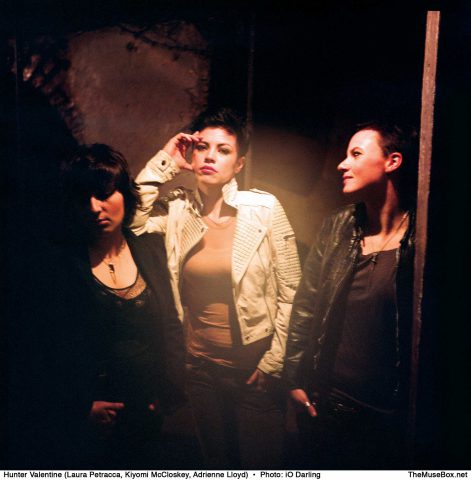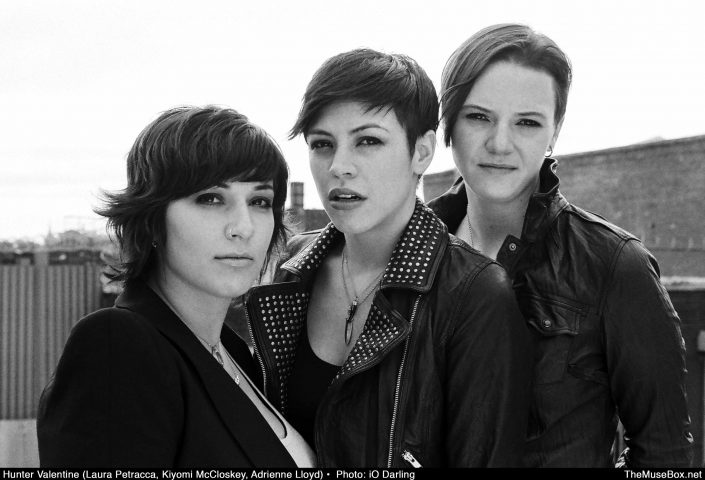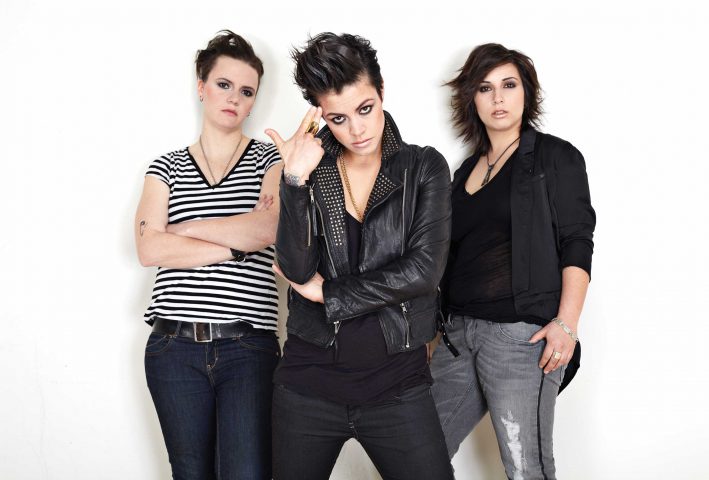Originally from Toronto, pop-rock-punk trio Hunter Valentine could best be compared to Janis Joplin and David Bowie doing a cover of the Ramones. They were recently named “Best Local Band” at GO’s 4th annual Readers’ Choice Nightlife Awards, and are now preparing to take New York City (and the entire U.S.) by storm. In the wake of their sophomore release, Lessons From the Late Night (Tommy Boy), lead vocalist and guitarist Kiyomi M, bassist and keyboardist Adrienne Lloyd, and drummer Laura Petracca talked with GO about their DIY philosophy, their move to Brooklyn, and labels telling them to tone down the whole gay thing.
GO: First, tell us how the band came to be.
Kiyomi: When I finished high school, I knew that all I wanted to do was play. I convinced Laura to attach herself to me and I think by now, six years later, I’ve shown her that everything is going to be ok.
Laura: So far! We played for a year with another band, then we became a two-piece, then we met Adrienne.
K: I think it’s been an increasingly serious commitment, like a relationship. Moving in comes first, then getting married, then having babies. Except instead of babies it’s albums.
L: We’re on our second baby right now.
That would be your latest, Lessons From the Late Night. What have you learned?
K: To take everything as a lesson, and never have regrets. To turn each experience into a positive one. “Je ne regrette rien,” as Edith Piaf said. We try to live that way.
L: Don’t feel guilty. It’s a waste of time. Whether you have a one-night stand or do three shots in a row and put your head in the toilet…
K: … Stand behind your choice! Next question!
How would you describe your sound?
K: Edgy pop-rock, with a punk twist. It’s hard, driving, has a lot of energy. But we still love a cheesy ballad, so you never know what’s going to happen. That’s what makes our band unique: it’s sort of difficult to place us in a genre.
Do you think mainstream pop fans are ready for the hard stuff?
Adrienne: We don’t really spend time thinking about what “mainstream pop” fans want, but I hope they’re ready.
L: It’s time for a change. I’d like our style, and female-fronted bands, to be the next mainstream.
K: Breaking into radio is difficult for every rock band with a female vocalist. There are few woman rock singers and there is hardly any good music on the radio. But we’re not going to shy away from doing what we love. If anything, we’ll push harder. If they play us on the radio, great. If they don’t, it’s ok. The most important thing is for people to come to our live shows.
L: KRS-One said it back in the 90’s. You can sell a million records but if you can’t do a live show, you’ll never make it.
Some of your themes pretty dark. Take your songs “The Stalker” and “Revenge”…
A: Love and heartbreak aren’t always light and easy, right?
K: “Revenge” and “The Stalker” actually have themes of empowerment. “Revenge” is about a girl seeking revenge on her rapist. There are all different kinds of heartbreak, and that’s what our more serious songs talk about. “The Stalker” is about a guy who showed up at my house after finding my address on the Internet, trying to talk to my mom and calling me on my personal cell phone. It’s about reclaiming my personal space.
The video for “The Stalker” won MTV-U’s “The Freshman” contest. Did the Heath Ledger/The Joker references have anything to do with it?
K: That’s just because of my mouth. I just have that natural creepy vibe.
L: You have Mick Jagger lips, but not Mick Jagger looks, don’t worry.
As a band of queer women, some of your videos include hetero love scenes. What’s up with that?
L: Are you thinking about “Typical?” Can I give you the behind-the-scenes answer to that? We actually really wanted to have two girls run into each other’s arms, but not a single one of our extras would do it.
K: There’s some straight content, and some gay content. We don’t ever want to cut anybody off from listening to our music.
Do you feel pressured to play straight in the music industry?
A: I once read an interview with Canadian musician Owen Pallett where he said something like, "I find the politicization of my sexuality boring." And I remember feeling almost offended and disappointed in him, but now I’m a little closer to understanding what he meant. When you’ve put so much into making a record and questions about whom you sleep with come up more often than the actual music, it’s easy to grow despondent. But rock has always exuded sexuality and fans have always interpreted what that sexuality means to them.
L: For us, because we are openly lesbian, it’s obvious. So why should we be less lesbian? I’ll be honest: we’ve been told to be less gay, but it hasn’t changed us.
You’ve relocated to NYC. You know what they say: if you can make it here…
K: This city is work-obsessed, so having a New York-based team has pushed us in ways we would never have imagined in Canada. We need to stay on top of social networking online, especially keeping content up to date, because there’s so much competition.
A: It’s been especially interesting working in an industry that has swallowed and destroyed the old business model of how to make money. There’s no way you can depend on “the way things are done.” It just doesn’t exist anymore.
Why Brooklyn?
L: Brooklyn has some really influential music coming out now: Matt and Kim, MGMT, Yeasayer, Grizzly Bear. Part of the reason for moving here was to be around that.
How do you keep your DIY work ethic while signed to a label like Tommy Boy?
A: I think any musician, signed to any label, would agree that it is more important now than ever before to keep the DIY ethic.
L: Actually, one of their mottos is “Don’t lose yourself.” They’re going to help you, but the only way to get ahead is to believe in yourself and not leave it up to anyone else to do things for you.
K: If you continue to work the way you did as a band before being signed, it’s just that much more people power. Since the beginning we’ve been printing our own flyers, hitting the streets promoting for shows, and we’re not going to ever feel like we’re too big for that.
You’ve mentioned honesty when talking about music. What makes music honest or dishonest?
K: If we’re writing about a bad breakup or a friend’s addiction, every time we go on stage and perform that song we try to put ourselves in the place we were in when we wrote it. And what makes music dishonest is when you’re singing about something that doesn’t affect you, and you’re doing it because you think it’s a hot sell.
You have a big following in your hometown, Toronto. How often do you go back to Canada?
K: We go quite often. We have both American and Canadian management. And both of our teams are all female. We call them “Team Lady Killer.”
L: It’s like our band, we had no idea it was going to be all women. We were a four-piece with two guys, and when that didn’t work out we weren’t specifically looking for a female bass player.
Did you play any Hunter Valentine music before your current lineup?
K: No we didn’t, “Staten Island Dream Tour” was the only song.
L: It was the second song that Kiyomi ever played for me.
K: I met her at a bar when I was 17…
L: Her friend said “She’s the best singer in the world” and I said “Uh huh.” I had been playing music with other bands for seven years, but when I sat down and listened to her sing she blew me away. My parents thought she was a 40-year-old black soul singer on the demo she gave me.
I guess you’d never been to Staten Island before you wrote that.
K: No, I just thought it sounded really magical. And when I finally went I was like… “Wow, I don’t think they have a dream tour here.”
The ferry’s a bargain, though. How do your NYC fans differ from your Canadian fans?
A: I’d say that our Toronto crowds tend to be very mixed, in age, gender, socially. I have a feeling our New York base will diversify.
What are your favorite venues to play in NYC?
A: We played the Stonewall Inn on the 40th anniversary of the Stonewall riots. That was pretty amazing.
K: Arlene’s Grocery let us play when we’d never even played in the States. I wish other venues would help bands grow like that.
To celebrate the release of Lessons, you played 13 shows in one day. Was that a world record?
A: I think so, but what seemed even more significant was proving to ourselves that we could pull it off.
K: The only other band that’s done it was an L.A. band that did 9 or 10 shows. I don’t know if any other band has. I don’t imagine why they would want to. We just thought it would be a cool idea on the day of our release to play in as many venues as possible. It wasn’t about breaking a record, but we found out that we could. And I’m still tired.
You played a few parks and subways. Did the cops give you a ticket?
K: We had battery-powered amps we could pick up and run with if the cops came. We were chased out of the Lorimer stop, ran onto the subway, and said “let’s do a show here.” We had a good following off the street that came with us. And you can find their videos and photos on YouTube and random blogs.
You have some Pride events coming up on the west coast. Do you have other U.S. tour dates planned?
K: We’re doing a national tour in early fall with The Cliks and Killola, and shooting a video for “Revenge,” which will probably come out in late summer. The album is out now on iTunes, and available in stores worldwide. n





What Do You Think?